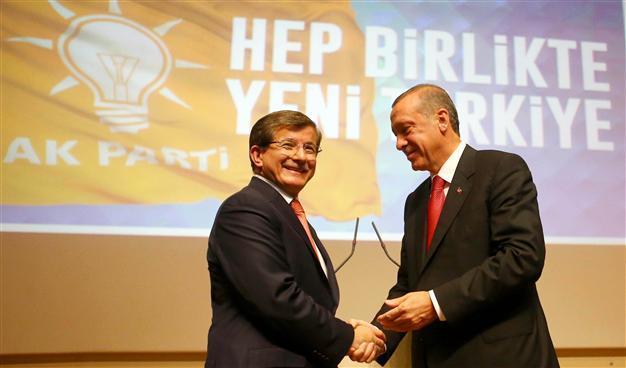Davutoğlu designated as AKP leader and new prime minister
Serkan Demirtaş - ANKARA

Recep Tayyip Erdoğan and Ahmet Davutoğlu (L) shake hands at the AKP headquarters in Ankara on Aug 21. AA Photo
Turkey’s ruling party has formally designated Foreign Minister Ahmet Davutoğlu to be the successor of Recep Tayyip Erdoğan as both prime minister and chairman of the Justice and Development Party (AKP), marking the start of a new era in Turkish political life.The AKP’s Central Executive Board (MYK), which was convened under Erdoğan’s leadership, decided to propose Davutoğlu’s name for the chairmanship of the party, which will be elected during the AKP’s extraordinary congress in Ankara on Aug. 27.
The decision was announced by Erdoğan after a three-hour meeting at the party headquarters.
"Our nominee is our foreign minister, our Konya deputy, our brother Ahmet Davutoğlu," Erdoğan told the crowd, which included government ministers and journalists, at the AKP headquarters in Ankara on Aug. 21.
He said Davutoğlu was chosen following “very delicate deliberations” and due to his “determination to fight the ‘parallel state.’” The term “parallel state” is used by government supporters to refer to the followers of Islamic scholar and the AKP's ally-turned-nemesis Fethullah Gülen, who has been in voluntary exile in the United States for over a decade.
“We had consultations with everybody from the people on the street to the highest bodies of our party,” Erdoğan added regarding the selection of Davutoğlu. “We have come to a certain point in peace and brotherhood; the unity of this movement comes above everything. Many people hope for cracks within our party, but we have survived such operations.”
Davutoğlu took the stage after Erdoğan, addressing him as "Mr. President."
"The movement of the AK Party was not the product of a certain context. It is a movement rooted in a state tradition that walks to the future, and our president is our leader," Davutoğlu said, describing the party as "a movement that closed the interregnum and restored our state."
"The great restoration movement that has been realized over the past 12 years will continue without interruption. The country that was regarded as a sick man 12 years ago is now on its feet, has remembered its historic mission, and started a blessed march," he added, vowing that neither the "parallel state" nor any other force could stop this march.
Davutoğlu is expected to be given the mandate to form the next government by Erdoğan on Aug. 29, a day after the official presidential handover. He will become Turkey’s 26th prime minister following a procedural confidence vote at Parliament in early September.
Strong support for Davutoğlu
In-house consultations conducted by Erdoğan following his election as president on Aug. 10 indicated that Davutoğlu’s name was endorsed by the AKP’s relevant bodies and a considerable number of lawmakers. Even outgoing President Abdullah Gül recently touched on Davutoğlu’s probably candidacy for both positions, adding that he was sure the current foreign minister would be successful in his new capacity.
The most prominent supporters of Davutoğlu include a group of younger generation politicians led by Ankara deputy Yalçın Akdoğan, one of Erdoğan’s closest advisors. Erdoğan’s decision to select Davutoğlu as the new leader may therefore also be interpreted as a sign that the ongoing struggle between young and veteran members of the AKP is coming to an end.
Davutoğlu’s controversial foreign policy is still being discussed inside and outside Turkey. A former professor of international relations, Davutoğlu was appointed as foreign minister in 2009, despite not being a lawmaker at the time. He entered Parliament in 2011 as Konya deputy; but his role in shaping Turkish foreign policy dates back to 2002 under his capacity as chief advisor to PM Erdoğan and then-Foreign Minister Abdullah Gül. His book, titled “Strategic Depth,” contains important hints about the foreign policy understanding he has been propagating.
Why did Erdoğan choose Davutoğlu?
There are various factors in Erdoğan’s selection of Davutoğlu as his successor. One of the most important reasons is the belief that Davutoğlu, as elected prime minister, would be the best option to work in full harmony with Erdoğan as elected president. For many, this harmony has been well tested over the years and Erdoğan would surely capitalize on it during his presidential tenure, to be started on Aug. 28.
In addition, Davutoğlu’s loyalty to Erdoğan during difficult times, such as last summer’s anti-government Gezi Park protests, Dec. 17 corruption operation, fight against the “parallel state,” as well as his role in challenging Ekmeleddin İhsanoğlu throughout the presidential election campaign, are seen as big pluses in the AKP.
As a respected figure in the party and a well-known figure among the AKP’s grassroots, Davutoğlu is also believed to have the capacity to run the party’s new cadres and management without causing too much in-house tension. This is particularly the case as Erdoğan wants a permanent AKP chairman and prime minister who will work with him at least until 2019.
Another factor paving the way for Davutoğlu is his academic background, which has contributed to the AKP’s nationalist-conservative rhetoric and policies. Although long criticized by many for pursuing dangerous “neo-Ottoman policies,” his passionate involvement in developments in Gaza, Egypt, Syria and elsewhere is seen as a positive among many AKP supporters.
















